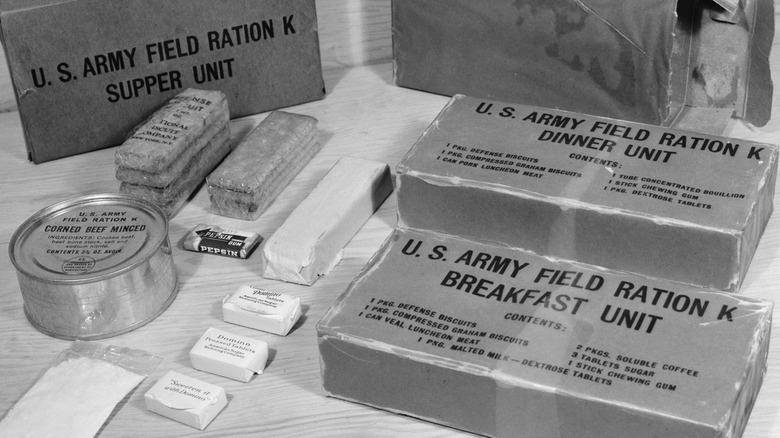Salt Water Taffy's Surprising Connection To World War II
Salt water taffy is a chewy, sugar-packed candy that conjures up nostalgic memories of many a person's childhood, but you might not have known about this sweet, stretchy treat's interesting connection to World War II.
The confection was often sent as part of overseas care packages to U.S. soldiers during the war (via History). It was its abundance of sugar and corn syrup, coupled with its secure wrapping in individual paper, that made it an ideal product to transport long distances, since there was little concern over potential damage. As noted in The New York Times, salt water taffy is "less perishable than other sweets" and therefore can "survive the rigors of shipping."
And unlike M&M'S, taffy neither melts in your hand nor your mouth, so it held up much better than items such as chocolate. Despite its name, taffy never included salt water as an ingredient, although regular salt was added in the production process.
Taffy for the troops
Taffy became even more important when food rations were implemented during World War II to conserve scarce resources, which included sugar. By spring 1942, "Americans were unable to purchase sugar without government-issued coupons" (via History).
It was around this time that candy-making rivals Fralinger's and James' — the leading candy companies on the Atlantic City, New Jersey boardwalk where salt water taffy originated in the 1880s — teamed up in the effort to distribute taffy overseas to soldiers. Although sugar rationing limited their production, these manufacturers and other taffy makers prioritized the armed forces amid the wartime rationing, saving as much salt water taffy as they could for the troops while closing to the public for days at a time when sugar ran out.
In a 1997 interview with The New York Times, Mary Fisher, an employee of James' Salt Water Taffy Shop (now called James Candy Company) during World War II, recalled the reasoning behind it. "It was important that the soldiers got it first,” Fisher said. ”There was a war on, and all of us did our bit.”

